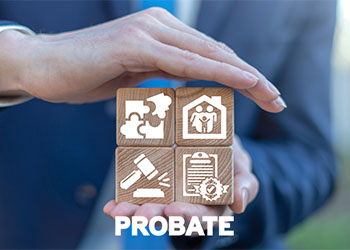Does a Spouse Inherit Everything
in Pennsylvania?
June 8, 2022
 If you lose a spouse, unless there is a living trust, you and any other remaining family members will have to undergo probate proceedings to distribute the decedent’s assets to beneficiaries.
If you lose a spouse, unless there is a living trust, you and any other remaining family members will have to undergo probate proceedings to distribute the decedent’s assets to beneficiaries.
If your spouse left a will, then that document will ultimately determine who gets what, but if your spouse dies without a will – called dying intestate – then the probate court – called Orphan’s Court in Pennsylvania – will divide the estate according to the state laws of intestacy or inheritance.
Not every asset is considered part of a person’s estate upon death. Jointly held assets, insurance, and retirement policies with a named beneficiary pass directly to the other spouse, named co-owner, or beneficiary. Only assets held in the decedent’s own name are subject to probate.
If you’ve just lost a spouse in or around Pittsburgh, Pennsylvania, and are facing probate and have questions, contact the probate administration attorneys at the Luvara Law Group LLC.
With more than 75 years of combined experience, our attorneys can answer all your questions and help you navigate the probate process to protect your interests. We proudly serve clients in Greensburg, Washington, Waynesburg, Uniontown, and New Castle, Pennsylvania.
Which Assets Are Subject to Probate?
If your spouse dies with a will, that document will generally be the final word on who gets what. As noted earlier, however, certain assets transfer immediately without going through probate proceedings in an Orphan’s Court. These assets include:
Property held in joint tenancy or tenancy by the entirety
Life insurance proceeds with a named beneficiary
Funds in a retirement account such as a 401(k) or IRA with a designated beneficiary
Payable-on-death bank accounts
Securities held in a transfer-upon-death account
These assets will pass to the other spouse or named co-owner or beneficiary without the need for probate. Only assets held solely in the decedent’s name are subject to probate and division by the law of intestacy if your spouse dies without a will.
Understanding Intestate Succession
If your spouse dies intestate – without a will – the probate judge will use its law of intestacy to determine who gets what, usually by percentage. In Pennsylvania, what portion of the estate the spouse receives under intestacy depends on whether the deceased had living parents or descendants – children, grandchildren, or great-grandchildren.
The shares distributed are pretty straightforward under two circumstances: First, if there is a surviving spouse but no parents or descendants, and second, if there are children but not a spouse. In the first case, the spouse gets everything, and in the second case, the children get everything.
After those simple scenarios, things get a bit more complicated. If there is a spouse with descendants from the spouse and the deceased, the spouse inherits $30,000 plus one-half of the remaining estate. The children get the other half.
Suppose a spouse dies with $450,000 in assets. The spouse would get $30,000 plus half of the remaining $450,000, or $210,000. The children would get the other $210,000 split among them.
The same formula applies if there are just a spouse and parents surviving the deceased spouse. The spouse would get $30,000 plus one-half of the remaining estate, and the parents would get the other remaining half.
If there is a spouse and surviving descendants from the deceased and someone other than the surviving spouse, then the current spouse inherits one-half of the estate, and the descendants get the other half. If there are parents but no surviving spouse or descendants, the parents get everything. If there are siblings but no spouse, parents, or descendants, the siblings inherit everything.
Seek Reliable Legal Guidance
Probate proceedings can be lengthy and costly if heirs, would-be beneficiaries, or creditors raise objections, but without a will, the state will pretty much decide everything. To protect your own interests, however, it is advisable to seek legal guidance as you navigate probate.
If you’ve just lost a spouse in or around Pittsburgh, Pennsylvania and you’re about to enter probate, contact us at the Luvara Law Group LLC. We can help you exercise your rights and protect your interests. Reach out to us immediately, we also serve clients in Greensburg, Washington, Waynesburg, Uniontown, and New Castle, Pennsylvania.